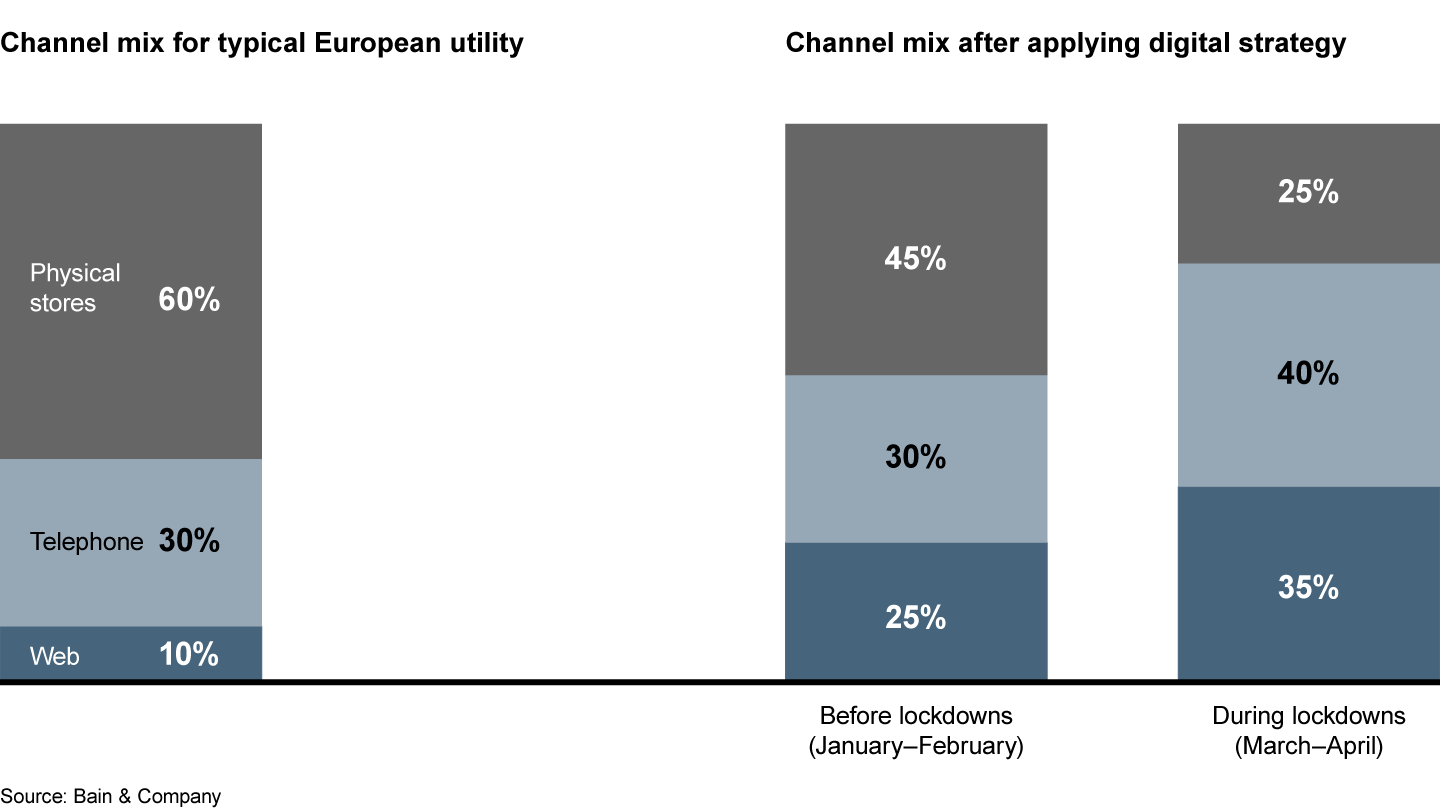Article

As Europeans begin a gradual return to business and an extended period of uncertainty, utilities in the region are assessing what they’ve learned from the Covid-19 lockdowns and how that informs their customer engagement and digital strategies.
Some of the changes experienced by utilities in recent months may return to normal as lockdowns ease—for example, the overall declines in energy use and the shift from commercial and industrial usage (which declined by about 25%) to residential (which grew by about 10%).
One change that may last beyond the initial lockdowns is the new popularity of their digital channels, which increased significantly in most markets. These increases in digital engagement represent a significant opportunity for Europe’s utility businesses, one that executives will need to understand better in order to refocus their sales and customer engagement programs and long-term strategy goals. As people return to work, a more traditional balance will be restored. But some newly acquired habits will stick, and utilities that capitalize on the lessons learned in recent months can position themselves for greater resiliency in the future.
Some of those needs are immediate, and executives should be acting on them already. At the same time, they should be planning for the changes that will be necessary as the industry weathers the economic storm and the recovery. It’s helpful to think about these activities in four critical categories.
- Protect and enable employees. Just as with companies across the world, European utilities have had to rapidly develop new ways of working to enable some employees to work from home. One utility that had to act quickly to virtualize its call centers saw a drop in service levels by about one-fifth of normal activity during the first week of lockdown, but it was able to restore full capacity over the following 10 days. As lockdowns are lifted, utilities are also making changes in the common spaces of their work environments to allow more distance between workers and make contact safer.
- Retain and support customers. Now is the time to take specific actions to meet any unmet customer needs and to protect the customer base from switching providers. For example, one European utility company offered a free trial of a bundled package of services that included broadband connectivity. Early results show the company on track to beat its first-year goals, with more than 5% of its customer base trying the offer and a higher than 80% satisfaction score. A similar program at another European utility cut churn rates in half over three years.
- Encourage digital adoption to reduce costs. What investments in digital have utilities already made that they could make better use of now? Are there behavioral or organizational changes that they could make to encourage the use of these new tools? For example, one European utility simplified its online sales form to make it easier for customers to sign up for new services while also reducing associated support costs. One of the outcomes of this rapid shift to digital is that executives may have a clearer view of how customers are using these channels and what they would like them to look like a few years out. Large-scale digitalization could help incumbents narrow the gap in unit costs between their operations and those of digitally native new entrants. Bain’s analysis of unit costs among utilities in the UK found that new digital entrants operating at scale enjoyed unit costs up to 80% lower than those of their incumbent competitors, and experience suggests that those ratios are similar across European markets.
- Boost growth through digital sales. Now that utilities have seen the possibilities and potential of a rapid shift toward digital in their customer engagement, they should be finding ways to make it last. More customers are signing up through the web and mobile applications, an increase of about 30% compared with last year. Utilities can keep that percentage high by continuing to develop a seamless digital experience for customers. For example, some utilities are using artificial intelligence to analyze customer contact patterns so that they can adjust staffing levels to meet anticipated needs. Another utility linked account data to the customer rather than the meter to reduce the risk of churn when the customer moved.
Separately, each of these measures has an effect, but a comprehensive strategy can shift sales more rapidly toward digital strategy and will make room for new opportunities (see Figure 1). By combining such a strategy with offers tailored to this challenging moment for customers, utilities can accelerate the shift to digital and emerge from the crisis in a more resilient position, having a more competitive edge against new entrants.



Coronavirus
The global Covid-19 pandemic has extracted a terrible human toll and spurred sweeping changes in the world economy. Across industries, executives have begun reassessing their strategies and repositioning their companies to thrive now and in the world beyond coronavirus.